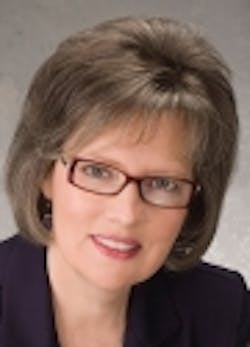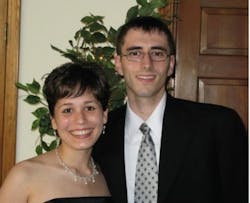Husband and wife public health team
I found out about them after they talked with Mark Hartley (RDH editor) at a dental conference. They work at Syracuse Community Health Center, Inc., which operates a network of six school-based health centers in partnership with the Syracuse City School District, as well as eight additional health care delivery sites in the Syracuse.
Timur works in one of the high schools and Elena is in an elementary school, as well as a program called "Project Bright Smiles," where care is delivered to schools with no onsite health center by using mobile dental equipment. I recently asked them both some questions.
Why did you decide to go into dental hygiene?
Elena: I have had an interest in dentistry since I was very young. My experiences visiting the dental office as a youth were very positive. I was that annoying child patient with a million and one questions. When I decided to pursue dentistry as a career it was just a matter of whether I wanted to be a dentist or a dental hygienist. I thought about it, and the person who had really made the biggest impression on me during my visits was the dental hygienist. She was very personable, and really took the time to build relationships with her patients. I admired that aspect of the work and looked forward to experiencing that same type of confidence and trust from my patients.
Timur: When I began to think of dental hygiene as a career it was appealing because of the flexibility in a dental hygiene work schedule, and the decent pay scale. However, shortly after beginning my education in the dental hygiene program, I realized how much was involved. Having the ability to provide a much needed service to my appreciative patients, and watching how the field of dental hygiene is continuing to progress, is something of which I consider a privilege to be a part.
Elena and Timur: We have no regrets choosing dental hygiene as a career. We entered our dental hygiene program and emerged with not only a wonderful career, but also each other. Being able to share our daily experiences with each other, share our thoughts about a recent hygiene journal, and attend annual meetings together is an added bonus we thoroughly enjoy.
How did you get into dental public health?
Elena: Upon graduation we were very excited to work in an office that focused mainly on periodontally challenged patients. We loved to see the complete turnaround in a patient's tissue and often their overall well-being. So I worked in that field for about a year and a half, but the area my husband and I then lived in had a class of hygienists graduating every year.
So it was very difficult to find full-time jobs with the benefits we desired. I decided to post my resume online and see what else was out there. Within a few weeks I received a phone call from my current employer asking if I might consider moving to Syracuse to work at a health center in the inner city.
We were initially hesitant about working in public health; however, we decided to go for it. I mentioned that my husband was also a dental hygienist and asked if they could use two. Now here we are, living in Syracuse.
What are your current positions?
Elena: I am currently working in both a comprehensive school-based health center for grades K through eight, and Project Bright Smiles.
Timur: I am also in a school-based health center where I work with a high school student population.
Timur and Elena: As part of these health centers there is a nurse practitioner/physician's assistant and a dental hygienist onsite five days a week. A dentist performs exams and restorative work once a week. The children are able to receive dental and health care services while in school.
We also just recently began Project Bright Smiles, a sealant program in the schools that do not have a school health center. We currently have six schools enrolled in the program, and are working on including five more. With our portable equipment, the children are able to receive a dental exam, prophy, fluoride varnish, and sealants. It is an ongoing effort where we return every six months for recall appointments as well.
Can you discuss any particularly interesting experiences you've had in your dental public health positions?
Elena and Timur: Working in the field for the past two years has been a huge eye-opening experience. Coming from an area of private practice where our patients came pretty regularly every six months, to the current area that has a huge underserved population, is something that is difficult to describe. Many of the patients we see have never seen a dentist, or a toothbrush for that matter.
This ranges from the children we treat on up to their parents. Seeing five-year -olds with as much subgingival calculus as the adult periodontally involved patients we used to treat is something we never imagined.
It's amazing to have a high school student present for treatment, and find that every single tooth in his or her mouth has severe caries. All of these experiences and many more have touched our hearts and helped us to see how much we are needed.
We did not need any additional education for our current positions. However, working in public health has really strengthened our desire to want to do more for our patients. We are eagerly looking forward to the approval of the advanced dental hygiene practitioner in our area.
What advice would you give to a practicing hygienist who is thinking of doing something different?
Timur and Elena: We would tell them not to be apprehensive about trying another avenue of dental hygiene. If you had asked us what area of hygiene we would be working in, we both would definitely have said perio private office.
We never thought we would enjoy working in public health, or with children for that matter, but the opportunity presented itself and we are so happy we did not let it pass us by. The difference someone can make cannot be measured. The need is there and there are so many dental hygienists who can play a huge part in meeting that need. There are so many facets to dental hygiene – do not be afraid to explore them.
Christine Nathe, RDH, MS, is a professor and graduate program director at the University of New Mexico, Division of Dental Hygiene, in Albuquerque, N.M. She is also the author of "Dental Public Health Research" (www.prenhall.com/nathe), which is in its third edition with Prentice Hall. She can be reached at [email protected] or (505) 272-8147.
